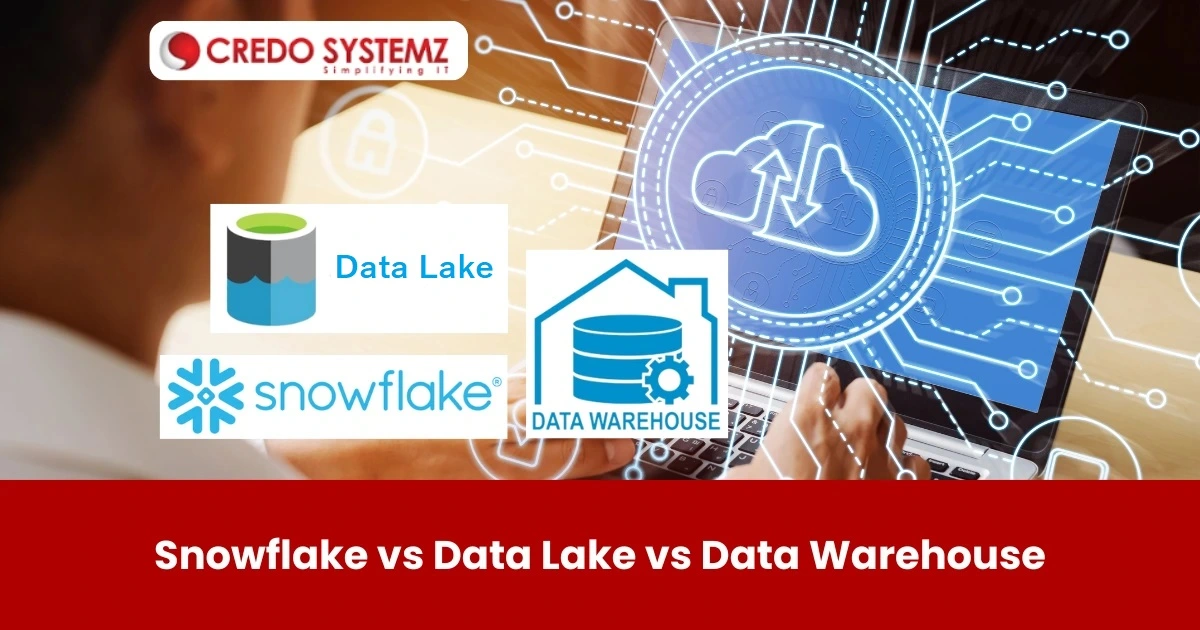
Introduction
In the domain of data management, Snowflake, Data Lakes, and Data Warehouses are essential components of data engineering and data analytics. They are responsible for managing, processing and analysing large volumes of data. This article delves into the key differences, use cases of snowflake, data lake, data warehousing and how they complement each other in modern data strategies.
Snowflake
Snowflake is a cloud-based data platform that handles vast amounts of structured and semi-structured data. It combines the functionality of traditional data warehouses with some features of a data lake. To gain the knowledge of snowflake, join Credo Systemz Best snowflake training in chennai
Key Features of Snowflake
Snowflake data platform is known for its:
- Cloud-Native Architecture,
- Built-in Security,
- Support for Semi-Structured Data,
- Concurrency and Performance,
- Separation of Compute and Storage.
This cloud-native architecture is designed to leverage the cloud’s elasticity and scalability. It can process JSON, Avro, and Parquet directly. The built-in security provides encryption, data masking, and role-based access control. Snowflake offers high performance for concurrent users, workloads and allows independent scaling of compute and storage resources.
Best Use Cases of Snowflake
- Advanced analytics and reporting.
- BI tools integration.
- Handling mixed workloads.
- Real-time and batch data processing.
Data Lake
Data Lake is a powerful centralized repository designed to store vast amounts of diverse data types. It can store unstructured, semi-structured, and structured data in its native format.
Key Features of Data Lake
Data lake is designed to handle massive data volumes and optimized for large-scale storage of unstructured and semi-structured data.
Data Lake accepts data in various formats like text, video and sensor data. It supports big data analytics and works well with frameworks like Apache Spark and Hadoop.
Best Use Cases of Data Lake
- Data exploration and discovery.
- Machine Learning (ML) and AI model development.
- Archival and historical data storage.
- Integration with streaming data sources like IoT.
Data Warehouse
Data Warehouse is a structured repository to store highly structured and processed data. It is essential for enterprise data management to extract and transform data from various sources. It is optimized for analytical queries and reporting.
Key Features of data warehouse
- Data Organization: To Store data in a structured and predefined schema.
- Data Analytics: High query performance for complex analytical workloads.
- ETL Process: Requires Extract, Transform, Load (ETL) for data ingestion.
- Data Quality: Ensures high-quality, reliable data for decision-making.
Best Use Cases of data warehouse
- Historical data analysis.
- Business Intelligence and reporting.
- KPI tracking and dashboards.
- Aggregated and summarized data storage.
Key Differences of snowflake, data lake and data warehouse
In a modern data ecosystem, Snowflake, Data Lakes, and Data Warehouses are used together in which:
- Data lake serves as the foundation which is the primary storage for raw and unprocessed data.
- Data warehouse provides structured and summarized data for business reporting and dashboards.
- Snowflake acts as an agile platform for analytics, bridging the gap between raw data and structured reports.
Want to know more about the course curriculum, career counseling, or video references? Just ping us on WhatsApp!
Choosing the Right Tool
The choice depends on the organization’s needs and market demands. For scalability and cost-effective storage, a Data Lake is ideal. For structured analytics and reporting, a Data Warehouse works best. For hybrid use cases requiring flexibility and cloud-native capabilities, Snowflake stands out.
Conclusion
As Snowflake, Data Lakes, and Data Warehouses serve distinct purposes, they are not mutually exclusive. Organizations can leverage all three to build a robust, scalable, and efficient data strategy.
Join Credo Systemz Software Courses in Chennai at Credo Systemz OMR, Credo Systemz Velachery to kick-start or uplift your career path.
